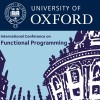A Relational Logic for Higher-Order Programs
Co-written by Gilles Berthe (IMDEA Software Institute, Spain), Marco Gaboardi (University at Buffalo, SUNY, USA), Deepak Garg (MPI-SWS, Germany), Pierre-Yves Strub (Ecole Polytechnique, France)
Relational program verification is a variant of program verification where one can reason about two programs and as a special case about two executions of a single program on different inputs. Relational program verification can be used for reasoning about a broad range of properties, including equivalence and refinement, and specialised notions such as continuity, information flow security or relative cost. In a higher-order setting, relational program verification can be achieved using relational refinement type systems, a form of refinement types where assertions have a relational interpretation. Relational refinement type systems excel at relating structurally equivalent terms but provide limited support for relating terms with very different structures.
We present a logic, called Relational Higher Order Logic (RHOL), for proving relational properties of a simply typed lambda-calculus with inductive types and recursive definitions. RHOL retains the type-directed flavour of relational refinement type systems but achieves greater expressivity through rules which simultaneously reason about the two terms as well as rules which only contemplate one of the two terms. We show that RHOL has strong foundations, by proving an equivalence with higher-order logic (HOL), and leverage this equivalence to derive key meta-theoretical properties: subject reduction, admissibility of a transitivity rule and set-theoretical soundness. Moreover, we define sound embeddings for several existing relational type systems such as relational refinement types and type systems for dependency analysis and relative cost, and we verify examples that were out of reach of prior work.




